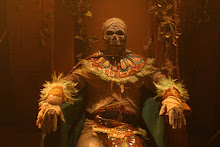Robert Bidinotto blogs about a dinner held in the book's honor. Surprisingly, many of the participants appear to have been adults. Some may even hold jobs, though this has not been confirmed.
Naturally on this special occasion we will hear many effusions of praise from loyal Randians, starting with Bidinotto himself, who declares that the book's issuance represents "a milestone in human literature, philosophy, and achievement."
Hmm. Literature? Doubtful. Philosophy? More than doubtful. Achievement? Well, the damn thing is really long!
Bidinotto also includes a photo of himself with Barbara Branden, confessing that when the shot was snapped, he was "still misty-eyed over her extraordinary tribute to Rand."
Careful, Bob! Emotions are not tools of cognition!
Ah, but we forget. Emotionalism of the most cloying kind is permitted in one and only one Randian context - tributes to the greatness, the genius, the sheer awesomeness of Ayn Rand herself. As Murray Rothbard incisively observed lo these many years ago, Randism is comprised of an exoteric and an esoteric teaching. The exoterica consist of individualism, capitalism, reason, selfishness, and all that good stuff. The esoteric teaching - the heart of the beast - consists of one tenet and one tenet only: "Ayn Rand is the greatest person that has ever lived or ever shall live."
On this semicentennial, no doubt many Randinistas will be moved to pontificate on how brilliantly their favorite novel (and for many, the only novel they've read since high school, except maybe for The Fountainhead) predicted the future. Look around us, they will cry. See how it all came true, just as Ayn in her infinite wisdom foretold! Then they will say something about high taxes and collapsing bridges.
But let's take a closer look. Here are a few political, economic, cultural, and other developments that Atlas failed to foresee:
A period of prosperity commencing in the late '50s and continuing, with only minor downturns, until the present day. (Atlas foresaw a Great Depression.)
The information revolution - personal computers, the Internet, and loathsome little blogs like this one. (In Atlas, people are still banging away on typewriters and getting their news from newsreels.)
The outsourcing of basic manufacturing industries to Third World countries, and the rise of a service- and information-based economy. (Sayonara, Rearden Steel.)
The eclipse of rail travel by the airline industry, and the eclipse of cargo trains by the trucking industry. (Happy trails, Taggart Transcontinental.)
The ubiquity of television. (Galt's speech is broadcast mainly on the radio. There is a passing reference to television, but TV does not play any role in the story. This is especially odd since TV was already well established by 1957.)
Americans' mass immigration to the Sunbelt and the West. (In Atlas, all the financial and commercial action is in New York City and its surrounds. The West is a lot of open desert, suitable for running train tracks through. Colorado is so empty that a whole valley can be hidden there, unknown to the outside world. The South does not appear to exist at all.)
New directions in science. (Gene-splicing, quantum theory, string theory or any equivalents are absent from Atlas, which presents a scientific community still mired in Newtonian assumptions.)
The demise of hats. (Nobody wears hats anymore. In Atlas, everybody does.)
Now, suppose someone had told Ayn Rand fifty years ago, on the day of her book's triumphant debut, that over the next five decades there would be a significant growth of government spending, taxes, regulations, and controls ... and that in the same period of time, there would be unprecedented prosperity, an unrivalled explosion of scientific and technological knowledge, and a blossoming of freedom around the world.
Would she have believed it? No way. In high dudgeon she would have insisted that such an outcome was logically untenable, entailing fatal contradictions.
Yet that's exactly what has happened.
So ... Happy Birthday, Atlas. Enjoy your cake and punch. But don't party too hearty.
Frankly, dear ... you're showing your age.
